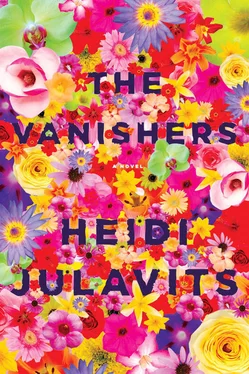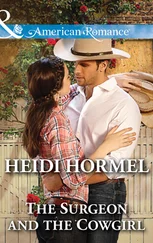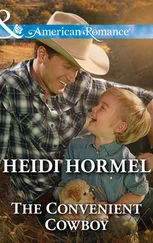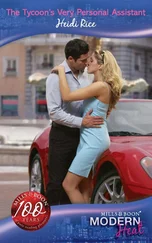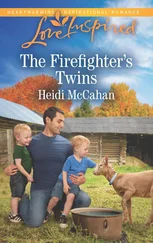It can sew, it can cook, it can talk talk talk , Blanche would say after he’d stomped off to his study, to which I would rejoin, Will you marry it, marry it marry it .
She had married it. And thank God. When Blanche arrived, our years preceding her arrival appeared, by contrast, a weary slog, a tiptoe, a blueness. And yet, with Blanche, there were boundaries. Blanche had never had children because she’d never wanted children. As much as she loved me, she did not desire to be my mother, in deference to my real one, yes, but also in deference to her own inclination to provide, for the needy, the occasional break from their lonely routine. She was the hired help, a hospice worker by trade, beloved by her patients and their families. She existed for me, too, as a temporary caretaker whose generosity was limitless because the job was not.
Blanche’s hug concluded and my father stood to take his turn. My father expressed physical affection like a bad mime. He threw himself at me and administered the Heimlich maneuver of hugs, then, after stripping my coat from my arms and forcing it on a passing busboy, situated me on a chair and pushed me so far into the table that my lower ribs rubbed against the edge when I exhaled.
He seated himself across from me and made a low, silence-filling grunt that I’d mistaken for years as the sound of him clearing his throat, and had only recently come to identify as the grinding of his back molars. This was no harmless de-gumming of vocal cords. This was damage I was hearing.
We stared at our menus and readjusted, in those minute physical and emotional ways, to being in close proximity to one another.
As we waited for our drinks, Blanche chatted about the ceramics exhibit they’d seen that afternoon, and showed me the autobiography of the artist, a book called I Shock Myself .
“That,” I said, “is an amazing title.”
The waiter delivered a pitcher of sake and three small wooden boxes. Alcohol was contraindicated for twenty-three of my twenty-three medications. I filled my box with water.
“Did we mention that we saw James the other day?” Blanche asked.
“How is James?” I said. James had been my boyfriend from our chaste note-writing romance in the third grade through college and up to the summer before I’d left for the Workshop, at which point I’d been with him for a longer period of time than my father had been married to my mother, and we both thought we should try out other people. Unbeknownst to James, during the intervening two years, I had done nothing but hold tryouts.
“He’s seeing a Kathy,” Blanche reported. “He had no idea you’d left school.”
“We haven’t been in touch,” I said. “Not for any mad reasons.”
“I told him you hadn’t dated anyone since him,” she said.
“I hope you also told him that I’ve had sex with about fifty people since him,” I said.
My father origamied his paper chopstick sheath into a little staircase.
“Even if you did sleep with fifty people,” Blanche said, “it’s not in your nature to do so. There are thrilling harlots and there are steady old dogs. I’m sorry to report that you’re the latter.”
“You’d be surprised, Blanche,” I said. “I shock myself.”
Blanche and I knocked sake boxes.
We ordered, we endured the intensification of the restaurant sound track, one volume bump every five minutes, until we were pretty much screaming at one another, and my father rolled the cardboard cocktail flyer into an ear trumpet that he used in full view of the hostess, who was not the least bit guilted into turning down the music.
“I love this place,” he said, after our various makis and dons had, an hour after ordering them, still failed to arrive, and we were all gassy on fried peas.
Finally our meals appeared. Because we’d worked our way through all of the noncontroversial topics, my father asked about my health.
“You got my candida article,” Blanche said.
“I did,” I lied.
“Maybe what you have is sexually transmitted,” my father said into his rice bowl.
“That’s chlamydia,” Blanche corrected.
“Believe me, I’ve been tested for everything,” I said.
“And how is your job?” my father asked.
“A soul-crushing bore,” I said. “Otherwise great.”
“That’s life for most people,” he said. “That’s why you need to find something about which you are passionate.”
“I had something I was passionate about,” I said. “But I can’t do it anymore.”
“Maybe the Workshop wasn’t your true calling,” Blanche said. Blanche persisted in hoping I’d retrain my psychic abilities toward the pursuit of a more practical career; she thought I’d make an excellent member of a political advance team, danger-proofing foreign sites for upcoming diplomatic visits, preventing future harm instead of prying into the pasts of random strangers, for whom the damage was already done.
“But today something unusual happened,” I said.
I told them about the girl who tripped on the rug, her maybe-concussion, my visit to the Regnor, the vanishing films.
“I’ve never heard of anything so cruel,” Blanche said of the vanishing films, and of vanishing generally.
“Do you really think it’s cruel?” I said. “Would you rather, Dad, that mom be dead than alive and living elsewhere?”
“That’s not a question anyone should ever be asked,” Blanche said.
“I was asked that question earlier today,” I said.
“And how did you respond?” Blanche challenged. She was a steady old dog herself.
“She is dead,” my father interjected. “Thus making this a futile conversation.”
“Maybe a film is a bit much,” I said. “But a note might have been nice, don’t you think?” Once I’d asked my father why my mother hadn’t left a suicide note, to which he’d replied, We are not that sort of people . To his mind, this oversight of hers was less a mark of insensitivity than of the tensile strength of her character.
“Most meaningful sentiments are cheapened by articulation,” my father said.
“In America today …” Blanche began.
“In America today,” I said. “How could you possibly finish that sentence?”
“… people overestimate the value of expression,” Blanche said.
“Don’t be bitchy to Blanche,” my father said.
“Blanche can handle it,” I said.
“It’s your father who can’t handle it,” Blanche said. “Be nice to me for his sake.”
“Maybe that was her problem,” I said of my mother. “She never found something about which she was passionate.” My mother, or so my father liked to tell me, was “always a bit drifty.” The implication being that she might not have killed herself if she were less drifty, never mind that I considered suicide the least drifty act a person could commit.
“She had a passion,” my father said defensively.
“What?” I said.
“She was a metalsmith,” he said. “She won a fellowship to apprentice in Paris after we became engaged. She sold her jewelry on the street to make extra money. Then a gallery picked her up. She had some very rich clients. Famous clients. But you knew that.”
I stared at him incredulously.
“How would I know that if you’ve never told me?”
“Don’t be disingenuous,” Blanche said. “We know what you got up to at that school.”
“I don’t go there,” I said. “I mean that in the literal sense of the phrase.”
I could tell: They didn’t believe me.
“She lost her engagement ring while she was in Paris,” my father said, apropos of God knows what.
“Which I wouldn’t have minded so much,” he added, “except that it cost me the bulk of my tiny savings at the time.”
Читать дальше
